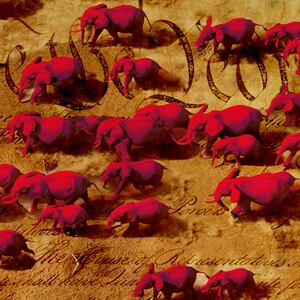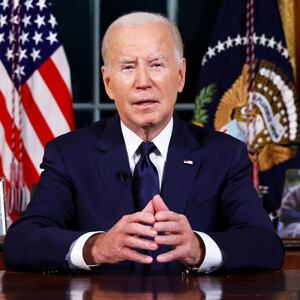Had Donald Trump been the U.S. president hosting this week’s APEC meetings, I have no doubt that the headline from the event would have been unchanged. It would have been: “He’s a dictator.”
The only difference is it would be Xi Jinping who was saying it to describe Trump.
Other than that, though, a Trump-hosted APEC meeting would likely have been unrecognizably different from the successful and productive forum hosted by President Joe Biden.
First of all, it is unlikely it would have taken place in California. More likely. Trump would have sought (as he did with the 2020 G7 Summit) to host it at one of his properties, like the allegedly bedbug-infested Trump National Doral golf club. While that effort fell flat, should he resume office, he will be surrounded exclusively by toadies who will be unable to refuse any of their dear leader’s dictates.
Trump, for example, might well have begun by confusing Chinese President Xi Jinping with the object of his longtime bromance, North Korean leader Kim Jong Un, as he did just over a week ago. Further, he certainly would have been unable to conduct the kind of detailed, multi-faceted diplomatic exchanges that Biden did—given that even Trump’s former top advisers were astonished by his ignorance of policy matters.
Biden, on the other hand, in both his press conference following the Xi meeting and in his remarks throughout the summit, showed a complete, confident mastery of an enormous range of issues—an unsurprising contrast given that Biden is the U.S. president with by far the most foreign policy experience, and Trump, among all our presidents, entered office with the least such experience and seemed to learn little during his time in the Oval Office.

President Joe Biden leaves after speaking during a press conference after meeting with Chinese President Xi Jinping during the Asia-Pacific Economic Cooperation (APEC) Leaders' week in Woodside, California on November 15, 2023.
Photo by BRENDAN SMIALOWSKI/AFP via Getty ImagesDuring the post-Xi press conference, Biden handled questions about two major world crises—in Ukraine and Gaza—as well as a range of issues concerning China including Taiwan, his relationship with Xi, human rights, the rivalry between the two superpowers, tensions in the South China sea, and more.
The four-hour meeting with Xi was highly substantive (unlike Trump’s superficial and embarrassing encounters with the Chinese leader in which his principle takeaway was “we love each other”) and covered a range of very sensitive issues.
On several key issues, the progress made was important. Most significantly, the U.S. and China agreed to resume military-to-military communications—critical to avoid potentially dangerous misunderstandings between the two nations. In addition, the two sides announced an agreement on cutting flows of precursor chemicals from China that have fueled the fentanyl crisis here in the U.S. Also cited was progress on issues like security issues associated with artificial intelligence.
Most importantly, the meeting with Xi was in and of itself an important step forward for the relationship. Communication at the highest level between the world’s two most powerful countries is essential both to reducing potential tensions and to finding areas in which the two countries can work together. Biden cited the fact that, since he was vice president, he has been building a relationship with Xi, one he says has resulted in him spending more time with Xi than any other world leader. Observers cited the candid nature of the exchanges between the two men and Biden said, “We’re back to direct, open, clear communications.”

President Joe Biden meets with Chinese President Xi Jinping during the Asia-Pacific Economic Cooperation (APEC) Leaders' week.
BRENDAN SMIALOWSKI/AFP via Getty ImagesThat’s a far cry from Trump’s flaccid performance in his exchanges with Xi and the erratic swings that marked the U.S.-China relationship under the 45th president.
From “love” to a chill over COVID marked by Trump’s racist nicknames for the COVID virus, from offering to look the other way and adopting Xi’s language on China’s crackdowns in Hong Kong and Xinjiang province to toughening policies during Trump’s last year in office, the last administration’s policies were anything but coherent.
There was seldom a middle ground. Xi was either Trump’s best friend or the leader of a nation that exported disease and death to the world.
Biden, on the other hand, entered office with a clear emphasis on the U.S.-China relationship, a systematic effort to strengthen U.S. measures to counterbalance China’s rise in the Indo-Pacific region, a truly comprehensive Indo-Pacific strategy, and unflinching language when it came to calling out what he calls China’s coercive economic policies. That said, Biden has also sought to ensure that there were guardrails against the relationship growing so acrimonious that it would become dangerous. When he met with Xi in Bali a year ago, it was his personal diplomacy that sent a message that the U.S. wanted to keep the relationship on an even keel.
Striking a balance between addressing concerns and identifying areas for dialogue and cooperation rather than swinging from one extreme to the other is a core distinction between the approaches of Biden and Trump. Biden has been dealing with China for many decades, and it shows in the fact that he is the principal architect of his administration’s policy regarding the PRC.
Trump, for his part, was ignorant, adrift, mercurial, narcissistic, at the mercy of the conflicting agendas of his team and of his family businesses.
Some have cited Biden’s comment that he still considered Xi a dictator to be discordant, a misstep that offset some of the good done in the Xi-Biden bilateral meeting. Some zeroed in on a perceived wince from the U.S. Secretary of State when Biden made the remark. But this is not the first time Biden has made such a remark. And the last time he did so, Blinken said (accurately, in my opinion), “The president always speaks candidly, he speaks directly. He speaks clearly, and he speaks for all of us.”

Secretary of State Antony Blinken looks on as President Joe Biden speaks during a meeting with Chinese President Xi Jinping during the Asia-Pacific Economic Cooperation (APEC) Leaders' week.
BRENDAN SMIALOWSKI/AFP via Getty ImagesBut the reality is that whatever the expressed unhappiness with the remark in the Chinese press, Biden sent an unmistakable message that also differentiates him from Trump and, frankly, from other recent U.S. presidents. He is not intimidated by Xi or by China. He will call things as he sees them.
Further, knowing Xi as he does, he also recognizes that this is neither’s first rodeo. Xi is 70. He has led China for a decade. Xi knows he is a dictator and has not been shy about flexing his muscle and strengthening his role during his time in office. The remark will do no damage to the relationship. What it will do is underscore that the president of the U.S. has a mind of his own and that he is able to promote dialogue, make progress, and communicate clearly that he has his eyes wide open.

US President Joe Biden and Chinese President Xi Jinping arrive for a meeting during the Asia-Pacific Economic Cooperation (APEC) Leaders' week.
BRENDAN SMIALOWSKI/AFP via Getty ImagesWhat is more, Biden does this all with the unmistakable grace of someone who has been interacting with world leaders on crucial issues for half a century. He may have lost a little of the spring in his step. But he has more than made up for it with substantive mastery and diplomatic deftness. He is his own man on these big stages and the U.S. benefits from it.
That was as clear in his remarks to executives attending the APEC summit as it was in those following the meeting with China’s Xi. Biden cited the gains made in the exchange with Xi and the “real differences” that exist with Beijing. Because he had given Xi such prominence in his own agenda for the summit, he was also able to be candid. (Xi, too, spoke to the executives with words of friendship and caution.)
But Biden also cited the goals for the overall summit. He enumerated economic priorities—like continuing strong U.S. economic growth through fair trade throughout the region, addressing next-generation challenges like AI, ensuring stable supply chains, and protecting the environment.

President Joe Biden and Chinese President Xi Jinping walk together after a meeting during the Asia-Pacific Economic Cooperation (APEC) Leaders' week
BRENDAN SMIALOWSKI/AFP via Getty ImagesIn short, Biden did one other thing that Trump never mastered. He was presidential. He was a gracious host. He laid out an agenda that had been carefully negotiated and orchestrated by his excellent diplomatic team. In fact, listening to him deliver those remarks on Thursday, I was struck by one other thing that Trump was never able to achieve, nor would he ever be able to replicate should he, God forbid, return to America’s highest office.
Biden was comforting. He was a good president doing what good presidents do. He was representing us with intelligence, dignity, and decency. Such accomplishments are much more difficult to achieve at a global summit with the complexity of this Asia-Pacific event than they may appear to be to the casual observer. But watch closely and value them appropriately.
Sadly, at this moment in American history, it is not a foregone conclusion that we will see them again in years to come. Worse still, should we not see them again, neither would China or our allies. The risks of regressing to Trump are bad enough at home, but we should not fail to consider the implications for America’s standing in and relationships with the world.








